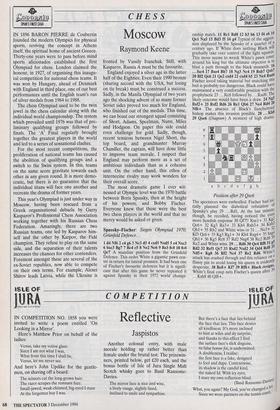Daaniu
SPAIWS FINEST CAA
CHESS
cADDRIiii9
SPAIN'S FINEST CAVA
Moscow
Raymond Keene
IN 1896 BARON PIERRE de Coubertin founded the modern Olympics for physical sports, reviving the concept in Athens itself, the spiritual home of ancient Greece. Thirty-one years were to pass before mind sports aficionados established the first Olympiad for chess. London claimed the honour, in 1927, of organising this inaugu- ral competition for national chess teams. It was won by Hungary, ahead of Denmark with England in third place, one of our best performances until the English team's run of silver medals from 1984 to 1988.
The chess Olympiad used to be the twin jewel in the chess calendar along with the individual world championship. The system which prevailed until 1976 was that of pre- liminary qualifying groups followed by finals. The 'A' Final regularly brought together the greatest players in the world and led to a series of sensational clashes.
For the most recent competitions, the proliferation of national teams has caused the abolition of qualifying groups and a switch to the Swiss system. In this, teams on the same score gravitate towards each other in any given round. It is more demo- cratic, but there is no guarantee that the individual titans will face one another and recreate the drama of former years.
This year's Olympiad is just under way in Moscow, having been rescued from a Greek organisational debacle by Garry Kasparov's Professional Chess Association working together with his Russian Chess Federation. Amazingly, there are two Russian teams, one led by 1Casparov him- self and the other by Karpov, the Fide champion. They refuse to play on the same side, and the separation of their talents increases the chances for other contenders. Foremost amongst these are several of the ex-Soviet republics, now able to compete on their own terms. For example, Alexei Shirov leads Latvia, while the Ukraine is fronted by Vassily Ivanchuk. Still, with Kasparov, Russia A must be the favourite.
England enjoyed a silver age in the latter half of the Eighties. Even their 1990 bronze (sharing second with the USA, but losing on tie break) must be construed a success. Sadly, in the Manila Olympiad of two years ago the shocking advent of so many former Soviet sides proved too much for England, who finished out of the medals. This time, we can boast our strongest squad consisting of Short, Adams, Speelman, Nunn, Miles and Hodgson. On paper this side could even challenge for gold. Sadly, though, recent tensions between Nigel Short, the top board, and grandmaster Murray Chandler, the captain, will have done little to improve team morale. I suspect that England may perform more as a set of ambitious individuals than as a cohesive unit. On the other hand, this ethos of internecine rivalry may work wonders for their overall score. '
The most dramatic game I ever wit- nessed at Olympic level was the 1970 battle between Boris Spassky, then at the height of his powers, and Bobby Fischer. Everyone knew that these were the best two chess players in the world and that no mercy would be asked or given.
Spassky—Fischer: Siegen Olympiad 1970; Griinfeld Defence.
1 d4 N16 2 c4 g6 3 Nc3 d5 4 cxd5 Nxd5 5 e4 Nxc3 6 bxc3 Bg7 7 Bc4 c5 8 Ne2 Nc6 9 Be3 0-0 10 0-0 Qc7 A mainline position from the Griinfeld Defence. This cedes White a gigantic pawn cen- tre in return for lateral pressure. It had been one of Fischer's favourite defences but it is signifi- cant that after this game he never repeated it against Spassky in their 1972 world champi- onship match. 11 Rd l Rd8 12 h3 b6 13 f4 e6 14 Qel Na5 15 Bd3 f5 16 g4 Typical of the aggres" sion displayed by the Spassky of a quarter of ,a century ago. If White does nothing
Black will gradually take over control of the light squares. This move seems to wreck White's pawn cover around his king but the ultimate objective is to blast a path through to the black monarch. 18 fxe4 17 Bxe4 Bb7 18 Ng3 Nc4 19 Bxb7 Qxb7 20 Bf2 Qc6 21 Qe2 cxd4 22 cxd4 b5 23 Ne4 Bxd,4 Fischer loved taking material but snatching this bait is probably too dangerous. Black could have maintained a very comfortable position with the prophylactic 23 ... Re8 followed by ... Rad8. The likely outcome would have been a draw. 24 T■185 Bxf2+ 25 Rxf2 Rd6 26 Re! Qb6 27 Ne4 Rd4 28 Nf6+ The absence of Black's fianchettoed bishop makes this invasion possible. 28 ... 29 Qxe6 (Diagram) A moment of high drama.
Position after 29 Qxe6 The spectators were enthralled. Fischer had ini- tially planned the diabolical refutation of Spassky's play 29 ... Rdl. At the last minute, though, he recoiled, having noticed the even more more fiendish response 30 Qf7!! Rxel + 31 14,4 Qc6+ 32 Kg3 Re3+ 33 Kh4 Rxh3 + 34 Kxni„ QM+ 35 Rh2 and White wins or 31 ... Ne3+ 34, Kf3 Qc6+ 33 Kg3 Rgl + 34 Kh4 Rxg4+ 35 hxr Qhl+ 36 Kg5 Rc8 37 Rd2 Nxg.lt 38 Rc2 Rd8 39 Re2 and White wins. 29 ...Rd6 30 Qe4 Rffl 31 g5 Rd2 32 Refl Qc7 33 Rxd2 Nxd2 34 Qd4 Rd8 35 Nd5+ Kg8 36 Rf2 Nc4 37 Re2 Rd6 White's attack has crashed through and this reliance on 3 flimsy pin to avoid losing his queen is evidently desperate. 38 Re8+ 1(17 39 Rf8+ Blackresig8,,s,; White's final coup nets Fischer's queen after .17
ICxh8 40 Qf8+.










































































 Previous page
Previous page